Savoring Moments in England: Part II
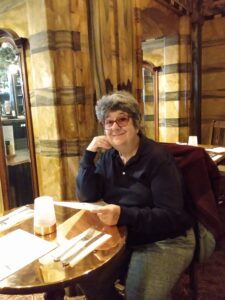
Floating down the Stream of Time
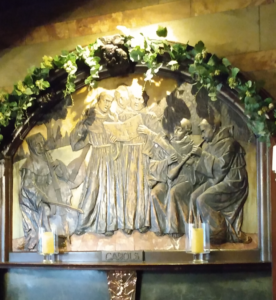
Floating down the stream of time from life to life with me. Makes no difference where you are or where you’d like to be…George Harrison
Eight weeks ago I unpacked from my England tour yet there is still much to “unpack” as I reflect deeper.
George Harrison’s lyrics floated in today… the quiet Beatle who shared my watery birth sign-Pisces.
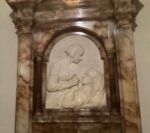
The Black Friars (Dominicans who wore black robes) founded a monastery in London from 1259 to 1539. Today in the same location, is the Black Friar’s pub, with monastic reliefs in stone and wood. After a visit to St. Paul’s Cathedral I relished my first Cornish pie at the pub.
Bolton Abbey 1154 Skipton, UK
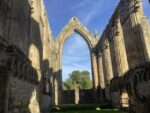
The passage of time moves in cycles though we often think of it as linear or even progressive…we yearn to imagine a brighter future and to feel the “arc bending toward justice” in Dr. King’s words.
Over the past several decades I perceived life from both sides: evolution and dissolution, a creative impulse and a destructive impulse. One day in the art studio my painting mentor, Sal Del Deo of Provincetown, described a Japanese couple painting together with big canvases on the floor. One of them placed paint on the canvas and the other messed it up. Tension is another way art imitates life!
Henry VIII destroyed Bolton Abbey (the Dissolution of the Monasteries) during the English Reformation. Destruction from religious wars and World Wars of the twentieth century is quite evident in England, commemorated throughout the country. Even in Westminster Abbey where Queen Elizabeth I and Queen Mary are buried side by side.
Anne Lister, Shibden Hall, Halifax
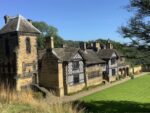
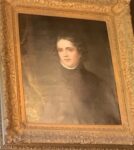
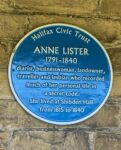
Near Bolton Abbey in Halifax is Shibden Hall. Just a couple of months earlier we had heard of the “Gentleman Jack” BBC/HBO series. Born in 1791, Anne Lister dressed like a man and was nicknamed Gentleman Jack. A shrew business woman and landowner, worldtraveler, she read widely from medicine to theology to literature. Anne kept a daily diary which included a private section written in code of her love affairs with women and her deep longing for a life companion.
F inally after many disappointments she married Ann Walker exchanging vows and rings in 1834 and taking communion together a month later at Holy Trinity Church in York. The first recorded lesbian marriage in England through not legal in church and law. They lived in Shibden Hall until Lister’s death in 1840. Holy Trinity Church in York commemorative blue plaque marks the couple’s union.
Sylvia Plath
Johnnie also brought us to the town where Sylvia Plath was buried. Unfortunately, we were all tired and didn’t venture up the steep hill to her gravesite. However last week a new book was published, “Loving Sylvia Plath” by Emily Van Duyne.
Like Lister, Plath’s life was hidden and still is being revealed. Her divorce from poet Ted Hughes was not finalized when she committed suicide. Consequantly, he inherited all her writings and according to this author even grabbed the letter of her intentions for her burial, property, and two children that she intended for her mother who lived in Massachus etts.
Over time much is revealed. The truth will set you free.
And by the way, everything in life is writable about if you have the outgoing guts to do it, and the imagination to improvise. The worst enemy to creativity is self-doubt. – Sylvia Plath
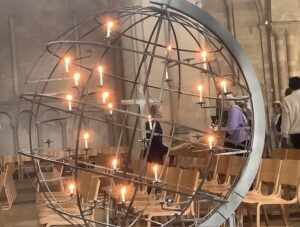
Pluto in Aquarius
Last week the planet, Pluto entered the sign of Aquarius for the next nineteen years. Aquarius signifies change, coming together, freedom and Pluto is symbolized by the phoenix rising out of its ashes, death and rebirth, changes that disrupt, the process of transformation. The American and French Revolutions ocurred the last time Pluto was in Aquarius.
Norwich Cathedral 1096 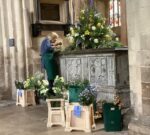
Norwich Cathedral is an active place with art installations like this peace sculpture. We attended an afternoon organ concert and watched a lady design floral arrangements.
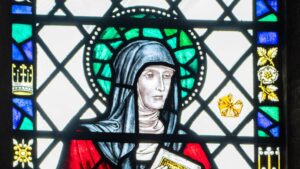
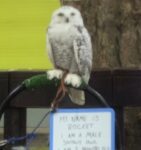
Julian of Norwich 1342
“All shall be well, and all manner of things shall be well”“Showings”
Dame Julian is the first woman author in England writing in the 1300s. She was a mystic and an anchoress enclosed in a church where she offered spiritual guidance through a little window. According to tradition Julian owned a cat. She is often depicted with her cat. We stayed in the Julian Centre next to her church that had been rebuilt since a fire in the middle ages and a bombing during World War II.
It is a wonderful place! Our only regret is wishing we could have stayed longer. The resident priest shared morning prayer in the church. Judy and I met an older couple from outside London in the kitchen and enjoyed talking together about our lives and our faith.
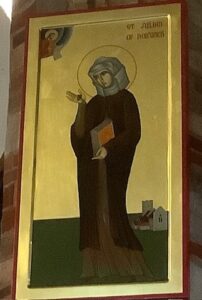
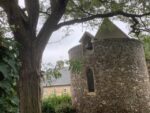
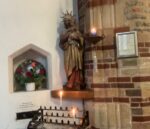
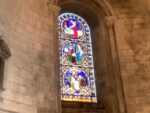
Travel is about discovery — learning to see with new lenses, understanding the present and future through opening to the past.
In England I saw changes that evolved over the centuries in the monarchy, industry, through wars between nations, tribes, and religions, and now technology. I was moved by the British love of preservation from history to its quaint villages to the arts.
Transcendent Moments – Winchester Cathedral
English Cathedrals are awesome and amazing and alive in the present. Every hour a priest leads us in a pause and a prayer to remind us that this is not merely an artifact of history but a living breathing place of worship. The Cathedrals give us back a sense of hope and timelessness.
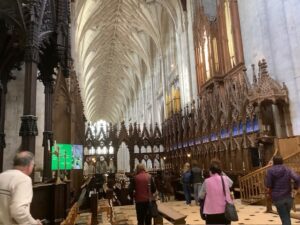
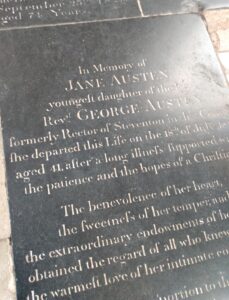
Evensong at Winchester Cathedral brought the dimension of sound through voices and organ permeating the color of red robes with brown and golden architecture as we participated from the pews in the choir stalls.
Excited to be arriving there we sang the 60s pop song with its ragtime beat: Winchester Cathedral You’re bringing me down…you stood and you watched us my baby left town.
Rochester Cathedral 1180
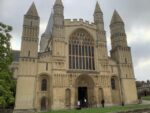
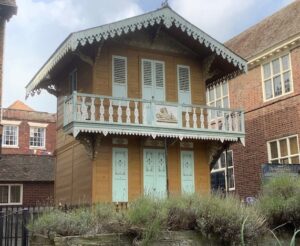
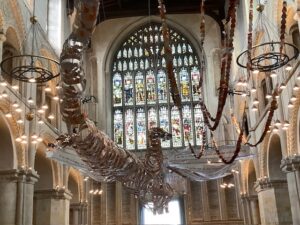 On the way to Canterbury we stopped in the delightful town of Rochester near where Charles Dickens was born. He returned to the area in 1865 as a successful writer and lived there until he died in 1870 (Gad’s Hill Place). Rochester celebrates a Dickens Festival with people dressing in his book characters. His writing studio is there where he wrote Great Expectations and The Mystery of Edwin Drood.
On the way to Canterbury we stopped in the delightful town of Rochester near where Charles Dickens was born. He returned to the area in 1865 as a successful writer and lived there until he died in 1870 (Gad’s Hill Place). Rochester celebrates a Dickens Festival with people dressing in his book characters. His writing studio is there where he wrote Great Expectations and The Mystery of Edwin Drood.
Murder in the Cathedral – Thomas à Becket – Canterbury Cathedral
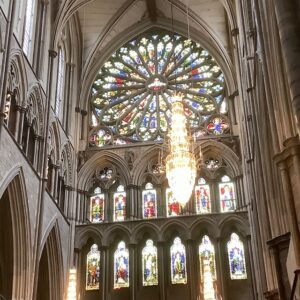
St. Augustine sent by Pope Gregory the Great in 567 AD to found Canterbury. It was rebuilt in 1070 by Norman Archbishop Lanfranc.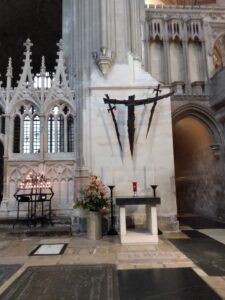
Here is the spot where King Henry II had Thomas of Becket, Archbishop of Canterbury, killed in 1170.
A guide told us that in May 1982, Pope John Paul II became the first Pope to visit England and Canterbury. He met with Dr Runcie, Archbishop of Canterbury, and the Prince of Wales. The Pope and the Archbishop knelt in silent prayer at this spot, completely barren at the time, where Becket was murdered. The Pope made one request to the Archbishop to add more compeling art work to the shrine as we see today – the shape of the cross made of the four swords from the knights that killed Thomas.
Poets Corner at Westminster Cathedral
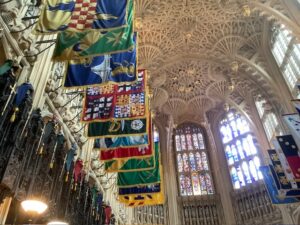
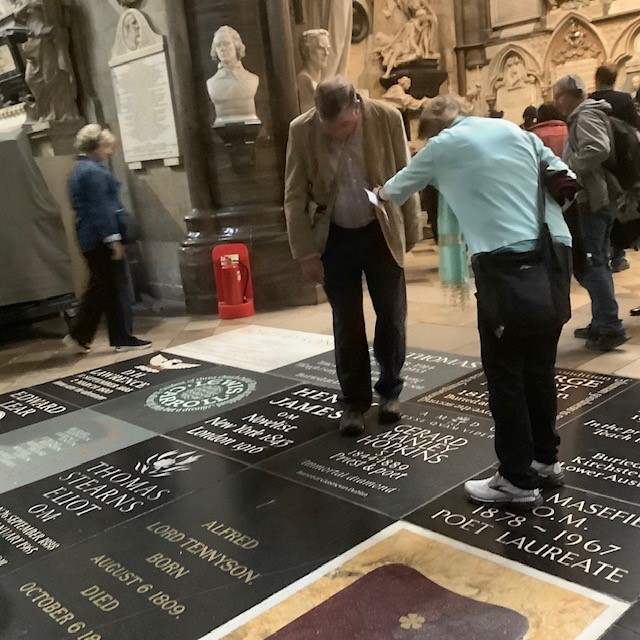
Our friends discover George Manley Hopkins
Last Stop – London – Freud House
At breakfast the morning after our visit to the Freud House my friends and I shared interesting dreams!
During the last two years of Freud’s life he resided in London with his family after fleeing the Nazis in Austria. His daughter, Dr. Anna Freud, remained in the home for many years after his death. Her therapy office and her father’s office, the entire place felt authentic. Surely, I felt Freud’s presence!
Interestingly, ancient artifacts fill his office, figures from major religions even though he was not a “believer.” We saw more books on archaeology than psychology.
As a pastoral counselor I was deeply informed by Freud’s writings especially those who followed him and proposed more relational and holistic approaches including object relations and Jungian therapies.
There I was alone in his office and my heart said “thank you.”
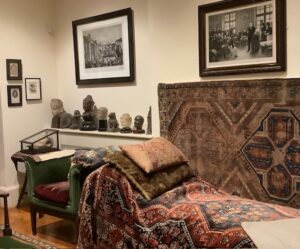
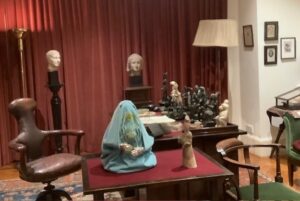
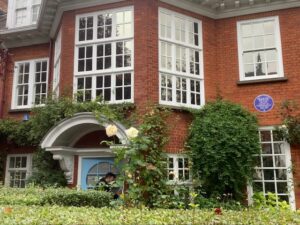
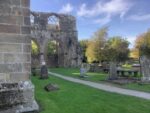
3 Comments
Jeanette Baldassarri
Dear Anne,
Thanks for sharing these wonderful moments from your England tour. The photos are all very beautiful and your words are inspiring. So glad that you and Judy had such a great trip!
Lois Cronin
Jeanette’s comments above said it best! And I love what you said here Anne: “Travel is about discovery — learning to see with new lenses, understanding the present and future through opening to the past.” So wise and true. Thanks for sharing!
Ierardi
Thanks Jeanette and Lois for your lovely comments. This trip did afford me a rich perspective on the past as I grapple with a changing present and uncertain future. History, literature, theatre and religion and the beauty of the countryside and villages are a treat that I will carry into these inner winter months….until the next journey!